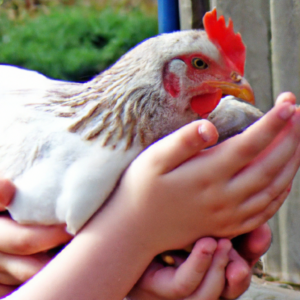
If you’ve ever dreamt of having your own flock of hens, but have been discouraged by the size of your backyard, fret not! Contrary to popular belief, chickens can indeed be kept in a limited space without compromising their well-being. Whether you have a small urban garden or a cozy suburban yard, let’s explore how you can transform your outdoor space into a happy and thriving haven for these delightful feathered friends.
Benefits of Keeping Chickens in a Backyard
Fresh Eggs
Keeping chickens in your backyard can provide you with a plentiful supply of fresh eggs right at your doorstep. There’s something incredibly satisfying and enjoyable about collecting eggs straight from the coop each morning. Not only are backyard eggs delicious, but they are also more nutritious compared to store-bought eggs. Backyard chickens have the opportunity to roam freely, eat a diverse diet, and bask in the sunshine, resulting in eggs that are richer in vitamins, minerals, and omega-3 fatty acids.
Pest Control
Chickens are nature’s own pest control experts. They have a natural instinct for hunting and pecking, which helps control the population of unwanted pests in your backyard. By actively hunting insects such as beetles, ticks, mosquitoes, and even small rodents, chickens help maintain a balanced ecosystem. This means fewer pests bothering you while you enjoy your outdoor space, and fewer chemicals required to keep those pests at bay.
Natural Fertilizer
One of the lesser-known benefits of keeping chickens in your backyard is the abundance of natural fertilizer they produce. Chicken manure is a highly effective and rich source of nutrients for your garden. It is high in nitrogen, phosphorus, and potassium, making it an excellent organic alternative to synthetic fertilizers. By allowing your chickens to roam freely in your backyard, their droppings will add valuable nutrients to the soil, promoting healthier and more abundant plant growth.
Considerations for Backyard Chicken keeping
Zoning and Local Regulations
Before diving into the world of backyard chicken keeping, it is crucial to familiarize yourself with the zoning regulations and local ordinances specific to your area. Some neighborhoods may have restrictions on the number of chickens you can keep, the type of structures you can build, or even outright prohibit backyard chickens altogether. Checking with your local municipality or homeowner’s association will prevent any potential legal issues and ensure that you can enjoy keeping chickens without any unwanted surprises.
Space Requirements
While chickens can adapt to a variety of living environments, it is essential to have enough space to meet their basic needs. Each chicken requires a minimum of four square feet of coop space and at least ten square feet of outdoor space for roaming and scratching. It is essential to provide adequate space for your chickens to stretch their wings, dust bathe, and engage in natural behaviors. If your space is limited, creative strategies such as vertical coop designs or integrating the coop with your garden can help optimize the available area.
Choosing the Right Chicken Breeds
Selecting the right chicken breeds is crucial when considering backyard chicken keeping. Different breeds have varying temperaments, space requirements, and egg-laying capabilities. Some breeds are more suited to urban environments, while others thrive in more spacious rural settings. It is essential to research and choose breeds that align with your backyard space, climate, and personal preferences. Consider factors such as noise level, adaptability, and egg production to find the breeds that will thrive in your specific backyard environment.
Housing and Coop Design
Investing in a well-designed chicken coop is essential for the health and safety of your flock. The coop should provide protection from predators, adequate ventilation, and comfortable roosting and nesting areas. When designing or purchasing a chicken coop, consider ease of access for egg collection and cleaning, as well as insulation and weatherproofing. It is also crucial to create a secure outdoor run to allow your chickens to enjoy fresh air and sunlight while keeping them safe from predators.
Feeding and Watering
Proper nutrition is key to keeping your chickens healthy and productive. Along with allowing them to forage for insects and grass in your backyard, it is essential to provide a balanced and nutritious diet. Commercial chicken feed, supplemented with kitchen scraps, leafy greens, and occasional treats, is a good starting point. Ensure that your chickens have access to fresh, clean water at all times, as hydration is vital for their overall well-being.
Healthcare and Disease Prevention
Just like any other pet or livestock, chickens require regular healthcare and disease prevention measures. Familiarize yourself with common chicken ailments and their symptoms, and establish a relationship with a local veterinarian who specializes in poultry health. Routine check-ups, vaccinations, and parasite control are crucial for keeping your flock healthy and disease-free. Furthermore, maintaining a clean coop, providing proper ventilation, and practicing biosecurity can help prevent the spread of diseases and keep your chickens thriving.
Entertainment and Enrichment
Chickens are highly intelligent and social creatures that thrive on mental stimulation and enrichment. Ensuring that your backyard chicken setup includes provisions for entertainment and enrichment is vital for their happiness and well-being. Providing perches, dust baths, and scratching areas allows your chickens to engage in natural behaviors. Additionally, hanging toys, mirrors, or even installing a small obstacle course can keep them entertained and active. Remember, happy chickens are healthy chickens.
Space-Saving Strategies for Backyard Chicken Keeping
Vertical Coop Design
When working with limited space, a vertical coop design can be a game-changer. By utilizing vertical space rather than taking up more ground area, you can house more chickens without compromising their living conditions. Stackable or multi-level coops allow you to maximize the available space while still providing ample space for your chickens to move around comfortably.
Integrating Coop with Garden
If you have a backyard garden, integrating your chicken coop with it can be a space-saving strategy that benefits both your plants and your chickens. By allowing your chickens to free-range in designated areas of the garden during certain times of the day, they can eat pests, weeds, and even provide natural fertilizer directly to your plants. Just ensure that you protect any cherished plants or delicate areas from their curious beaks.
Maximizing Vertical Space for Roaming
In addition to vertical coop designs, you can maximize vertical space for your chickens’ outdoor roaming area as well. Utilizing chicken wire or netting to create enclosed vertical areas, such as aviaries or tunnels, allows your chickens to safely explore and stretch their wings high above the ground. This not only gives them more space to roam but also helps keep them entertained and mentally stimulated.
Utilizing Balconies or Rooftops
If you live in an urban area with limited backyard space, don’t despair! Balconies, rooftops, or even small courtyards can be transformed into suitable chicken habitats. Ensure that the structure is secure, well-ventilated, and protected from predators. With some creative adaptations, you can bring the joys of backyard chicken keeping to even the most compact spaces.
Tips for Keeping Chickens in a Limited Space
Managing the Flock Size
When space is limited, it’s crucial to manage the size of your chicken flock accordingly. Be realistic about the number of chickens that can comfortably and safely inhabit your backyard. Overcrowding can lead to stress, health issues, and reduced egg production. Assess the available space, consider the breed’s space requirements, and aim for a flock size that balances both your space limitations and your chickens’ well-being.
Implementing Regular Cleaning and Maintenance
In a limited space, maintaining a clean and hygienic environment is essential for the health and happiness of your chickens. Regularly cleaning the coop, removing droppings, and replacing bedding will help prevent the buildup of harmful bacteria and parasites. Additionally, maintaining a tidy outdoor area and promptly addressing any pest issues will keep your chickens comfortable and healthy.
Utilizing Deep Litter Method
The deep litter method can be a useful technique for managing waste and reducing odors in a limited space. Rather than removing droppings and replacing bedding frequently, this method involves periodically adding fresh bedding material on top of the existing litter. As the litter decomposes, it creates a natural composting process that generates heat, which can help keep your chickens warm during colder months.
Building Chicken Runs
If your backyard space is truly limited, building chicken runs can provide a safe and confined area for your chickens to roam without encroaching on other parts of your property. Building runs along fences or walls can effectively utilize existing structures and make efficient use of the available space. Just ensure that the runs are properly secured and provide enough room for your chickens to move around comfortably.
Utilizing Composting Systems
Limited space shouldn’t deter you from exploring the benefits of composting with chicken waste. Composting systems, such as small-scale compost bins or even worm composting, can effectively transform chicken manure and bedding into nutrient-rich compost for your garden. These systems can be compact and easily implemented, allowing you to make the most of your limited backyard space.
Promoting Natural Foraging
Even in a limited space, you can encourage natural foraging behaviors in your chickens. Scatter feed and treats throughout the outdoor area to mimic their instinctual foraging activities. This not only provides mental stimulation but also helps keep them entertained and active. Additionally, planting chicken-friendly edible plants or providing hanging treats can further enhance their foraging experience.
Minimizing Noise and Odor
Living in a residential area requires you to be mindful of noise and odor levels. Selecting chicken breeds that are known for their quiet nature can help minimize noise complaints from neighbors. Additionally, maintaining a clean coop, employing odor-neutralizing techniques such as regular cleaning and proper ventilation, and avoiding overstocking can significantly reduce any potential odors associated with backyard chicken keeping.
Monitoring Health and Behavior
In a limited space, it’s important to closely monitor the health and behavior of your chickens. Regularly observe them for any signs of illness, stress, or anomalies in their behavior. Being proactive in identifying and addressing any health issues promptly can help prevent the spread of diseases and ensure the overall well-being of your flock.
Seeking Local Support
If you are new to backyard chicken keeping or have limited space, seeking local support can be incredibly helpful. Joining local chicken-keeping groups or forums, attending workshops or classes, or connecting with experienced backyard chicken keepers in your area can provide valuable insights and advice. They can share tips specific to your location, help troubleshoot any challenges you may face, and provide guidance tailored to your unique circumstances.
By considering the benefits of keeping chickens in a backyard, the considerations specific to limited space, and implementing space-saving strategies and tips, you can successfully enjoy the joys of backyard chicken keeping regardless of your available area. With a little planning, research, and creativity, you can create a thriving chicken haven right in your own backyard.







